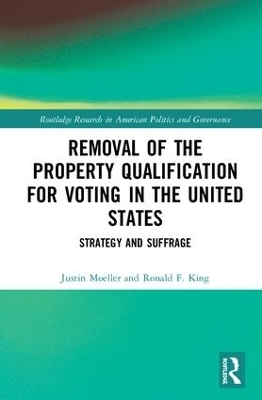
Removal of the Property Qualification for Voting in the United States
Routledge (Verlag)
978-1-138-72694-9 (ISBN)
In Colonial America, democracy was centered in provincial assemblies and based on the collection of neighbors whose freehold ownership made them permanent stakeholders in the community. The removal of the property qualification for voting in the United States occurred over three-quarters of a century and was among the more important events in the history of democratization, functioning to shift voting from a corporate privilege toward a human right.
Moving beyond the standard histories of property standard histories of property qualification removal, Justin Moeller and Ronald F. King adopt the theories and methods of social science to discover underlying patterns and regularities, attempting a more systematic understanding of subject. While no historical event has a single cause, party consolidation and party competition provided a necessary mechanism, making background factors politically relevant. No change in franchise rules could occur without the explicit consent of incumbent politicians, always sensitive to the anticipated impact. Moeller and King argue that political parties acted strategically, accepting or rejecting removal of the property qualification as a means of advancing their electoral position. The authors identify four different variants of the strategic calculation variable, significantly helping to explain both the temporal differences across states and the pattern of contestation with each state individually.
Justin Moeller is an Assistant Professor of Political Science at West Texas A&M, having completed his M.A. from San Diego State University in 2007 and his Ph.D. from the University of Georgia in 2012. An expert on the formal analysis of constitutional rules, his published work includes co-authored papers in American Politics Research and Public Choice. Ronald F. King is a Professor of Political Science at San Diego State University. His advanced degrees are from Oxford and Chicago. The author of four books and more than three dozen journal articles and book chapters, Professor King has received two Fulbright awards and research grants from the American Philosophical Society, the American Council of Learned Societies, the Russell Sage Foundation, and the Twentieth Century Fund. He has been awarded the title “Profesor Onorific” by the Political Science faculty at Babeş-Bolyai University in Romania.
1. Introduction: Property, Participation, and the Routes to Reform 2. The Politics of Partisan Preemption: Pennsylvania, Georgia, and New Hampshire 3. The Politics of Partisan Cooptation: Delaware, South Carolina, Massachusetts, and Virginia 4. The Politics of Partisan Replacement: Maryland, New Jersey, Connecticut, New York, and North Carolina 5. The Politics of Partisan Rejection: Rhode Island 6. Strategic Incentives and Franchise Reform: An Event History Analysis 7. Conclusion: The Expansion and Contraction of Democratic Rights Appendix: Overview of Property Restrictions on Suffrage
| Erscheinungsdatum | 21.09.2018 |
|---|---|
| Reihe/Serie | Routledge Research in American Politics and Governance |
| Zusatzinfo | 4 Tables, black and white |
| Verlagsort | London |
| Sprache | englisch |
| Maße | 152 x 229 mm |
| Gewicht | 326 g |
| Themenwelt | Geschichte ► Allgemeine Geschichte ► Neuzeit (bis 1918) |
| Geisteswissenschaften ► Geschichte ► Regional- / Ländergeschichte | |
| Sozialwissenschaften ► Politik / Verwaltung ► Staat / Verwaltung | |
| Sozialwissenschaften ► Soziologie | |
| ISBN-10 | 1-138-72694-X / 113872694X |
| ISBN-13 | 978-1-138-72694-9 / 9781138726949 |
| Zustand | Neuware |
| Haben Sie eine Frage zum Produkt? |
aus dem Bereich


